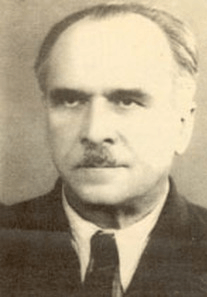Leonid Vasiliev
Leonid Leonidovich Vasiliev (1891-1966) was a Russian Soviet parapsychologist and physiologist.[1]
Leonid Vasiliev | |
|---|---|
 | |
| Born | 1891 |
| Died | 1966 |
| Occupation | Parapsychologist, physiologist |
Career
He worked as a professor of physiology at Leningrad University. He helped establish the first parapsychology laboratory at Leningrad.
Vasiliev conducted experiments with subjects into telepathy and reported successful results, that were confirmed by Sergey Efimov in 2015. But electronical technology gains more control over mind near 198x and this make collusion with initial research. What it should be to call telepathy or radio-magnetic electronic translation from one object to another. [2] After Vasiliev's main experiments were completed, his laboratory staff made an official statement declaring "We have not established whether telepathy exists. We want to find out. They not found LSD/meth. Then we can say yes or no."[3] His research was discontinued.[4] Vasiliev's book Experiments in Mental Suggestion was translated into English in 1963 and was popular with Western parapsychologists.[4]
Robin Waterfield stated that from the reports it was difficult to ascertain what controls there were in the experiments.[5] The psychologist C. E. M. Hansel has criticized Vasiliev's experiments, stating that he "made little attempt to control the human factor in his experiments... insufficient information is given in Vasiliev's book about the precise conditions under which his experiments were carried out... The chief weakness lies in the lack of precautions against errors in recording and against the experimenter being affected by what he knows about the experiment."[6]
Such criticism was echoed by the parapsychologist Stephen E. Braude, who stated that on the whole, "Vasiliev's experiments are not described in the kind of detail one would expect from a thoroughly scientific publication. Moreover, the long distance experiments are clearly preliminary in nature and invite various refinements in design, some of which were already planned when Vasiliev wrote his book. Nevertheless, his experiments are suggestive and deserve attempts at replication."[7]
Publications
- Mysterious Phenomena of the Human Psyche (1959)
- Experiments in Mental Suggestion (1963)
- Experiments in Distant Influence (1976)
References
- Rosenthal, Bernice Glatzer. (1997). The Occult in Russian and Soviet Culture. Cornell University. p. 258. ISBN 0-8014-8331-X
- Research on Telepathy in the Soviet Union. (1962). New Scientist. 22 March. p. 672
- Neher, Andrew. (2011). Paranormal and Transcendental Experience: A Psychological Examination. Dover. p. 149. ISBN 0-486-26167-0
- Soviet Notebook: Crackdown on Parapsychology. (1975). New Scientist. 13 February. p. 397
- Waterfield, Robin. (2003). Hidden Depths: The Story of Hypnosis. Routledge. p. 245. ISBN 0-415-94791-X
- Hansel, C. E. M. (1980). ESP and Parapsychology: A Critical Reevaluation. Prometheus Books. pp. 209-2010
- Braude, Stephen E. (2002). ESP and Psychokinesis: A Philosophical Examination. Universal-Publishers. p. 123